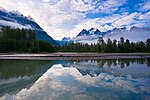The Port Townsend Film Festival began screening independent films in 1999.
Today, PTFF has expanded to eight theatres and screens over 90 films, mid-September, in Port Townsend's walkable National Historic District. Port Townsend, Washington, United States). Port Townsend is at the end of a peninsula surrounded by Port Townsend Bay, Admiralty Inlet and the Strait of Juan de Fuca. It is adjacent to Olympic National Park.
Theatres include the beautifully restored vaudevillian-era Rose Theatre and crystal-chandeliered "Starlight Room," with views of the snow-peaked Cascade mountains. Five more theatres are "created" in downtown buildings for the three-day weekend by installing large screens, projectors and state-of-the-art sound. Theatre seating ranges from 46 to 250.
Independent documentary and narrative film submissions are accepted from January–May, and are evaluated by a team of 26 reviewers. The Festival charges a small fee for submissions. Additionally, programmer Jane Julian attends larger festivals, such as Sundance, to select films and to invite chosen filmmakers to attend the Festival in person.
PTFF's mission is "to spark community by connecting filmmakers & audiences." More than 60 filmmakers attend the Festival. Passholders can choose from 42 films being screened each day, many of them with Q&A afterwards. Filmmaker panel discussions – with, say, composers or screenwriters; covering topics like indie film challenges; the popular recurring "storytelling" panel – are Saturday and Sunday mornings and open to passholders at any level.
Special Guests of the Festival (actors, directors and filmmakers of note, see below) meet students at local school assemblies, as well as speak to adult audiences during hour-long interviews after their films have screened. In April, the Festival invites women directors, producers, screenwriters and other film professionals for a weekend of "Women & Film", held at the Rose and Rosebud Theatres, with a special screening and a filmmaker roundtable at Fort Worden State Park's 250-seat Wheeler Theatre.
The Festival has more than 250 volunteers to assist with managing the Festival. PTFF operates year-round with a staff of three, and is supported by donors, local small businesses and pass sales.
The most popular gathering place between films during the Festival is Area 51, "The Festival Bar on the Dock." Housed in a small historic building on the city dock, the bar overlooks Port Townsend Bay.
The city also closes off one block of Taylor Street in front of the Rose Theatre in downtown Port Townsend during Festival days to house the Taylor Street Outdoor Theatre. The Outdoor Movie, which begins at dusk (7:30 p.m.), offers a free kid-friendly film each night of the Festival. The Outdoor Movie is projected onto a gigantic inflatable screen, nicknamed after the orca whale Keiko, with seating on straw bales.
Pass sales range from a one pass ($40) to Patron Pass with access to all parties ($1,500). The "Festival" level pass includes Friday's "Dinner on Taylor Street." More than 650 passholders and filmmakers are served.
All passes include a year-long Festival membership with film library privileges and discounted ticket and popcorn price to "First Tuesday Salon," held each month at the Rose Theatre. The Salon screens a film currently in national distribution, with an invited guest, often a film academic, to discuss various aspects of the film.
Schedules, links to film trailers, film synopsis, and filmmaker interviews are posted by August 10 at http:// www.ptfilmfest.com








